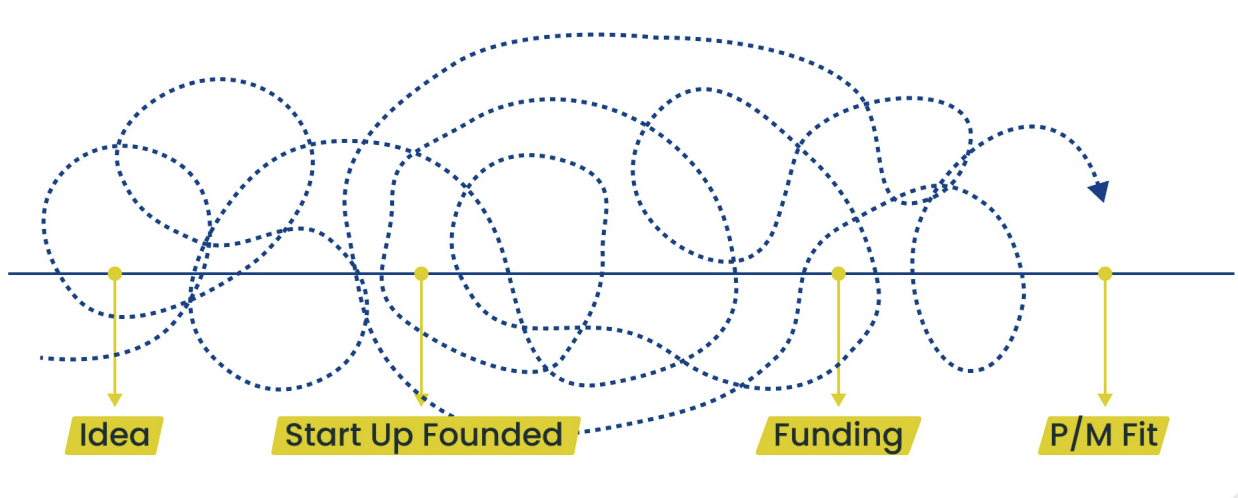The #1 Root Cause Startups Fail
Oct 7, 2022 • 5 min read
The success rate of startups is very low - 9 out of 10 startups fail. And that has been the case for years. While there is some good research on what are the top reasons startups fail (e.g. this one) I believe that the typical interpretations of research are more often than not missing the forest for the trees. Let me share why.
A 10% Success Rate Feels Like Gambling
The success rate of only 1 in 10 is low. But the even bigger red flag is that startup success rate doesn’t visibly improve over time. Often this is being explained by the widespread belief that entrepreneurs are a special breed that possess certain innate characteristics stemming directly from their genes. In other words, it is typically considered that entrepreneurs are born and cannot be made. We believe that this is a self-fulfilling prophecy and we’ve already shared our view.
“OK Vesko. If that’s not the explanation, then what is it?” Glad you asked!
The 10% success rate feels like gambling because it is gambling. Why? Because entrepreneurship as predominantly practiced today relies a lot on gut feeling and luck. Most entrepreneurs use hunches as their primary means of decision making. As a result, the typical entrepreneurship path is chaotic and that leads to sporadic and accidental, rather than predictable success. And that I believe is the #1 root cause why startups fail.

That, as a consequence, leads to the typical behavior of investors (VC, Angels, etc.) who invest with the expectation that only 1 in 10 companies will need to pay back the other 9. And to do that they are optimized to filter out startups without putting a lot of (if any) effort on developing. The 10% success rate has become the constant of the entrepreneurship universe!
So what’s the alternative?
From Accidental to Predictable Success
Predictable success means bringing “something” into our life that will improve the odds of our success as entrepreneurs. What is that “something”? You might be surprised to hear that this “something” is called theory.
It might seem audacious to assert that hard-headed, result-oriented, “just do it” people who comprise the majority of entrepreneurs, can benefit from applying theory. Indeed the terms theory and theoretical connotate impractical in modern business. But theories are statements of cause and effect - which actions yield results and why. So in essence, the entire point of a good theory is to help us predict the future with better precision.
The funny thing is that in practice we all use theories every time we take an action or make a plan. We do it with the belief that if we take these specific actions, we will get the results that we need. Essentially we are using theories that stem from our intuition which is a direct result of our experience.
So why are entrepreneurs still not using theories today?
The Problem With Entrepreneurship Theory Today
Let’s summarize the current situation with entrepreneurship theory (think methodologies and mental models) in a few bullets:
- Does theory on entrepreneurship exist? Yes, a lot of pieces exist.
- Are they useful? Yes, a lot of them have proven themselves in the last 10+ years.
- Are these theories available? Yes, they are. Typically they are captured in books.
- Are these books good enough? Yes and no. They are good because they are providing the knowledge. They are not good because the knowledge is impressive, but is typically passive and readers are not able to practically apply it.
- Are these theories actionable? Rarely. Often they need to be understood and translated to practical steps. And this has to be done by every entrepreneur.
- Are these theories easily discoverable? No. Unless you know what you are looking for it is hard.
- Are these theories independent of one another? They are typically presented as such, but in practice they are not.
To put it in another way - if you think about entrepreneurship theory as a puzzle, every entrepreneur that wants to be predictably successful has to put together that puzzle on their own. And here is the process:
- Discover a piece
- Find a good methodology for that piece
- Understand the theory
- Activate the theory (from passive knowledge to actionable steps)
- Connect that piece with all the other pieces
- Repeat
And all of that should consider the fact that the pieces are coming in the life of entrepreneurs sometimes in a reversed order. That process is typically referred to as “building a playbook” and entrepreneurs (as well as intrapreneurs) are often very proud of theirs.
“But Vesko… You said that there is a problem with the entrepreneurship theory today. What is it?” The problem is that every entrepreneur has to do the theory discovery/activation/connection process on their own. As if they are the first entrepreneur ever. That is not how we believe entrepreneurs should spend their time.
The Road Ahead
We believe that entrepreneurs should use their intuition and gut feeling to imagine the vision of the intended impact of their startup. In other words they should focus on their business idea rather than discovering what the entrepreneurship steps are. This is where we can help - at Icanpreneur we are focused on building the guided journey that helps aspiring and early entrepreneurs systematically go from idea, through investment, to product/market fit. Our goal is to give you the “entrepreneurial puzzle” already put together, activated and connected so that you can sweat over your business idea and not reinvent the wheel.
Author
Founder & CEO of Icanpreneur. Passionate about connecting people with their purpose of becoming successful entrepreneurs.
